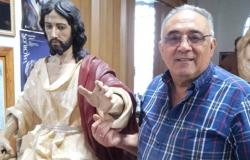Researchers and users of the Hispanic and Islamic libraries of the Spanish Agency for International Development Cooperation (Aecid) have raised the alarm over Foreign Affairs’ plans to convert the building’s two floors of reading rooms into offices for … accommodate about 85 workers. According to those affected, who in February and March submitted two letters signed by more than two hundred professionals, this project goes against the very essence of the library, which was built in the 60s expressly for that purpose, and will significantly reduce the services of an institution. leading in Europe. For Aecid, on the other hand, it is a program to “modernize” and “update” the facilities, which will mean “significant cost savings” and will also “enhance the projection of the library.”
The Aecid intends to convert these library reading and exhibition rooms into offices and enable a new, much smaller room, measuring 130 square meters, at the agency’s main headquarters, 300 meters away. The work has already begun. This week the library’s website included a notice about the inconvenience caused by the “conditioning works, movement of furniture and relocation of bibliographic collections” in the building, located between the Museum of America and the Jiménez Díaz Foundation. Many reference books that were in those rooms have already been removed to storage, leaving empty shelves visible. There will be no space for them in the new location. The organization that directs Anton Leis He plans to complete the transfer in summer.
“They prefer to desecrate the library rather than promote research,” he denounces. Teodosio Fernandez, Hispanicist and former dean of Philosophy and Letters at the UAM. «I have been working there for 50 years, and I have supervised 48 doctoral theses. It is the basis of research on the culture of Latin America in Spain. It is the second most important in Europe, behind Berlin, for these issues. “I have directed people from Mexico to South Korea.” Bernabé López, honorary professor of Arab and Islamic Studies at the UAM, denounces that the management “has not attempted to negotiate or seek solutions” and that the Aecid plan breaks the unity of the library and the circulation of documents.
Guillermo Navarro
The Aecid library houses two large collections, the Hispanic library and the Islamic one. As the agency itself recognizes, due to the quality of their funds they are considered first-hand sources among the most important specialists. The Hispanic collection contains the personal libraries of Eugenio d’Ors, Gerardo Diego, José María Chacón or José Velarde. The Islamic one, called ‘Félix María Pareja’, has recognitions such as the UNESCO-Sharjah 2015 prize and the Ibn Arabi Hikma 2019. There is a third collection that began in the 80s on development cooperation. In total, more than 700,000 volumes in books, magazines and electronic resources.
It was in 1964, due to the expansion of the Hispanic library, when the architects José Luis Fernández del Amo Moreno and Antonio Fernández Alba They built this building on the limits of the university campus of the Complutense University. The result, according to the Fernández del Amo Arquitectos website, was “a unique building where the three basic functions of a library are ingeniously combined: book depository with large storage capacity, reading rooms with extraordinary natural light and outbuildings. administrative and cultural.
If no one prevents it, the library will lose one of those “basic functions” in exchange, according to the official version of the Aecid, for “new reading rooms” located at the entrance to the main headquarters, the annex building, which “will optimize space and will improve its accessibility.
The building was built for the three basic functions of a library: book storage, reading rooms, and administrative and cultural offices.
The affected researchers refute that “the spaces that are planned to be allocated for consultation and exhibitions at the main entrance of the Agency are ten times smaller than the current ones, preventing tasks such as direct consultation of reference works and magazines, the holding of exhibitions, the support for students in internships within the library facilities, guided pedagogical visits and training sessions so necessary for those who begin to research, as well as the possibility of meetings with groups of users and visitors that are held from time to time. They also point out that “the idea of moving the consultation and reading tasks to the other end of the building […] “It is completely counterproductive both for the books and documents and for the personnel who must transport them.”
“Oversized” rooms
This newspaper tried to contact the director of the Aecid, Antón Leis, but he had a very tight schedule. In a March letter addressed to Moratinos, who was interested in the issue, Leis explained to the former Foreign Minister that this decision derives from the need to “end the dispersion of Aecid personnel in more than one headquarters.” The rental contract for the headquarters on Almansa Street expires at the end of the year without the possibility of renewal. «The transfer of all these workers [unos 85] “It is only viable through the use of the library’s current reading rooms, which are currently oversized for their current use (a maximum of 10 visitors per day for a total area of around 3,200 square meters),” says Leis in the text.
Leis argues that the entrance to the current reading rooms has an entrance “not easily accessible from public space.” [sic] poorly lit and unfortunately victim of frequent acts of vandalism. This partly explains why the library has been largely ‘forgotten’ by the agency as a whole. There is no doubt, he adds, “that the new reading room space will be smaller than the current one, but more than enough to continue providing the current services. […] There are undoubtedly some inconveniences to be resolved, such as the transfer of books from the warehouses, which will remain as they have been until now so that not a single book from the two collections has to change location to the new spaces for consultation, reading and exhibitions. and activities.
Juan Malpartida, who has directed ‘Cuadernos Hispanoamericanos’, a magazine founded in 1948 by Aecid, comments that in the thirty years that he has been linked to the house it has been common among the different general directors that they would like to get the library “out of the way.” «It seems that they had plenty of books. It is a bad Spanish: our politicians, whether from the right, center, left or half-pensioner, do not value culture too much, except when they have to present awards with photographers. The attempt to “marginalize” the library, he believes, is “barbaric.” Jesus Cano Reyes, professor of Hispanic American Literature at the UCM, is one of the more than two hundred signatories. “It’s a question of resources, after all,” he says, more restrained. «What is evident is that the institutions do not take care of it. It is something very valuable that is not being used. I want to be very cautious in my criticism, but I can say this.





